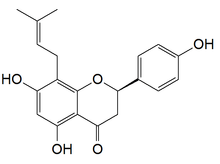Prenylflavonoid

Prenylated flavonoids or prenylflavonoids are a sub-class of flavonoids. They are widely distributed throughout the plant kingdom. Some are known to have phytoestrogenic or antioxidant[1] properties. They are given in the list of adaptogens in herbalism. Chemically they have a prenyl group attached to their flavonoid backbone. It is usually assumed that the addition of hydrophobic prenyl groups facilitate attachment to cell membranes. Prenylation may increase the potential activity of its original flavonoid.[2]
Monoprenyl isoflavone epoxidase is a key enzyme in fungal Botrytis cinerea metabolism of prenylated flavonoids.[3]
Many prenylflavonoids appear to have anticancer activity in vitro.[4]
Prenylchalcones, prenylflavones, prenylflavonols and prenylflavanones are classes of prenylflavonoids.
Examples
6-Prenylnaringenin, 6-geranylnaringenin, 8-prenylnaringenin and isoxanthohumol can be found in hops and beer.[5][6] Of the prenylflavonoids, 8-prenylnaringenin is the most potent phytoestrogen known.
Australone A can be found in Morus australis.[7]
6,8-Diprenyleriodictyol, dorsmanin C and dorsmanin F can be found in Dorstenia mannii.[1]
Epimedium wushanense contains a number of flavanoids. 37 compounds were characterized from the underground and aerial parts of the plant. Among them, 28 compounds were prenylflavonoids. The predominant prenylated flavonoid, epimedin C,[8] ranged from 1.4 to 5.1% in aerial parts and 1.0 to 2.8% in underground parts.[9]
Artocarpus nobilis contains prenylated flavonoids in its root bark.[10]
8-Prenylkaempferol can be found in Sophora flavescens.[11]
Prenylated isoflavonoids
A number of bio-active chemicals in has been reported from Millettia pachycarpa including several prenylflavonoids.[12][13] Several chemical analyses have yielded a number of novel prenylated isoflavones including erysenegalensein E, euchrenone b10, isoerysenegalensein E, 6,8-diprenylorobol, furowanin A and B, millewanins-F, G and H, warangalone, and auriculasin from the leaves.[14][15]
7-O-Methylluteone is a prenylated isoflavone. It can be found in the bark of Erythrina burttii.
Luteone is another prenylated isoflavone found in the pods of Laburnum anagyroides.
Wighteone (6-prenylgenistein), isowighteone (3′-prenylgenistein), and lupiwighteone (8-prenylgenistein) are genistein prenylated derivatives.[2]
References
- ↑ 1.0 1.1 Dufall, K.G.; Ngadjui, B.T.; Simeon, K.F.; Abegaz, B.M.; Croft, K.D. (2003). "Antioxidant activity of prenylated flavonoids from the West African medicinal plant Dorstenia mannii". Journal of Ethnopharmacology 87 (1): 67–72. doi:10.1016/S0378-8741(03)00108-9. PMID 12787956.
- ↑ 2.0 2.1 Shen et al. (March 2012). "Characterization of an Isoflavonoid-Specific Prenyltransferase from Lupinus albus". Plant Physiology (Plant Physiology) 159 (1): 70–80. doi:10.1104/pp.112.195271. PMC 3375986. PMID 22430842
- ↑ Tanaka, Mitsuharu; Tahara, Satoshi (1997). "Fad-dependent epoxidase as a key enzyme in fungal metabolism of prenylated flavonoids". Phytochemistry 46 (3): 433–9. doi:10.1016/S0031-9422(97)00322-1.
- ↑ Miranda, C.L.; Stevens, J.F.; Helmrich, A.; Henderson, M.C.; Rodriguez, R.J.; Yang, Y.-H.; Deinzer, M.L.; Barnes, D.W. et al. (1999). "Antiproliferative and cytotoxic effects of prenylated flavonoids from hops (Humulus lupulus) in human cancer cell lines". Food and Chemical Toxicology 37 (4): 271–85. doi:10.1016/S0278-6915(99)00019-8. PMID 10418944.
- ↑ Stevens, Jan F; Page, Jonathan E (2004). "Xanthohumol and related prenylflavonoids from hops and beer: To your good health!". Phytochemistry 65 (10): 1317–30. doi:10.1016/j.phytochem.2004.04.025. PMID 15231405.
- ↑ Dhooghe, Liene; Naessens, Tania; Heyerick, Arne; De Keukeleire, Denis; Vlietinck, Arnold J.; Pieters, Luc; Apers, Sandra (2010). "Quantification of xanthohumol, isoxanthohumol, 8-prenylnaringenin, and 6-prenylnaringenin in hop extracts and derived capsules using secondary standards". Talanta 83 (2): 448–56. doi:10.1016/j.talanta.2010.09.041. PMID 21111159.
- ↑ Ko, Horng-Huey; Yu, Sheu-Meei; Ko, Feng-Nien; Teng, Che-Ming; Lin, Chun-Nan (1997). "Bioactive Constituents ofMorus australisandBroussonetia papyrifera". Journal of Natural Products 60 (10): 1008–11. doi:10.1021/np970186o. PMID 9358644.
- ↑ epimedin C
- ↑ Li, Hui-Fang; Guan, Xiang-yu; Ye, Min; Xiang, Cheng; Lin, Chang-hu; Sun, Chao; Guo, De-an (2011). "Qualitative and quantitative analyses of Epimedium wushanense by high-performance liquid chromatography coupled with diode array detection and electrospray ionization tandem mass spectrometry". Journal of Separation Science 34 (12): 1437–46. doi:10.1002/jssc.201000899. PMID 21560245.
- ↑ Jayasinghe, U.L.B.; Samarakoon, T.B.; Kumarihamy, B.M.M.; Hara, N.; Fujimoto, Y. (2008). "Four new prenylated flavonoids and xanthones from the root bark of Artocarpus nobilis". Fitoterapia 79 (1): 37–41. doi:10.1016/j.fitote.2007.07.014. PMID 17855020.
- ↑ Chiou, Wen-Fei; Chen, Chen-Chih; Wei, Bai-Luh (2011). "8-Prenylkaempferol Suppresses Influenza a Virus-Induced RANTES Production in A549 Cells via Blocking PI3K-Mediated Transcriptional Activation of NF-κB and IRF3". Evidence-Based Complementary and Alternative Medicine 2011: 1. doi:10.1093/ecam/nep066. PMC 3137797. PMID 19592477.
- ↑ Singhal, Ashok K.; Sharma, Ram P.; Thyagarajan, Gopalakrishna; Herz, Werner; Govindan, Serengolam V. (1980). "New prenylated isoflavones and a prenylated dihydroflavonol from Millettia pachycarpa". Phytochemistry 19 (5): 929–34. doi:10.1016/0031-9422(80)85140-5.
- ↑ Ye, Haoyu; Chen, Lijuan; Li, Yanfang; Peng, Aihua; Fu, Afu; Song, Hang; Tang, Minghai; Luo, Houding; Luo, Youfu; Xu, Yongbin; Shi, Jianyou; Wei, Yuquan (2008). "Preparative isolation and purification of three rotenoids and one isoflavone from the seeds of Millettia pachycarpa Benth by high-speed counter-current chromatography". Journal of Chromatography A 1178 (1–2): 101–7. doi:10.1016/j.chroma.2007.11.060. PMID 18082754.
- ↑ Okamoto, Yoshinori; Suzuki, Atsushi; Ueda, Koji; Ito, Chihiro; Itoigawa, Masataka; Furukawa, Hiroshi; Nishihara, Tsutomu; Kojima, Nakao (2006). "Anti-Estrogenic Activity of Prenylated Isoflavones from Millettia pachycarpa: Implications for Pharmacophores and Unique Mechanisms". Journal of Health Science 52 (2): 186–91. doi:10.1248/jhs.52.186.
- ↑ Ito, Chihiro; Itoigawa, Masataka; Kumagaya, Minako; Okamoto, Yoshinori; Ueda, Koji; Nishihara, Tsutomu; Kojima, Nakao; Furukawa, Hiroshi (2006). "Isoflavonoids with Antiestrogenic Activity fromMillettiapachycarpa1". Journal of Natural Products 69 (1): 138–41. doi:10.1021/np050341w. PMID 16441086.
| ||||||||||||||||||||
| |||||||||||||||||||||||||||||||||||||||||||||||||||